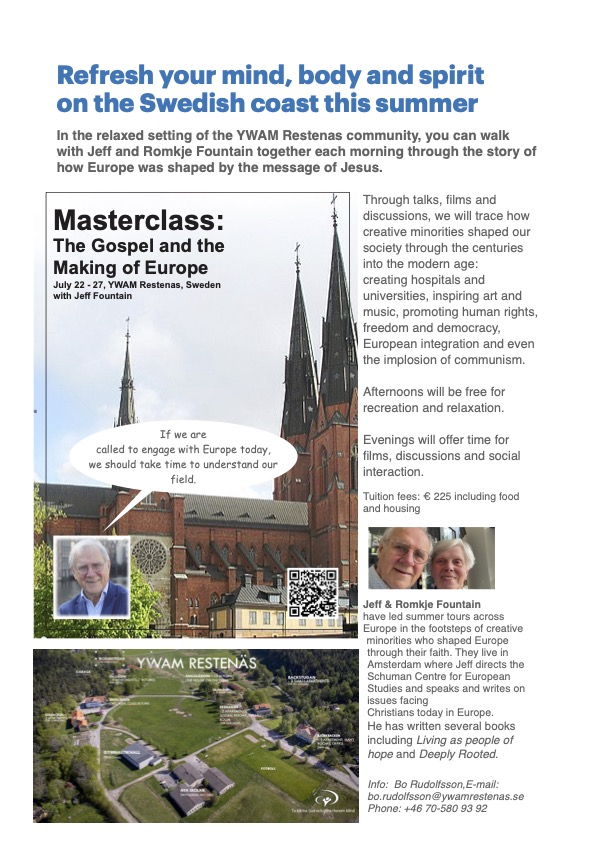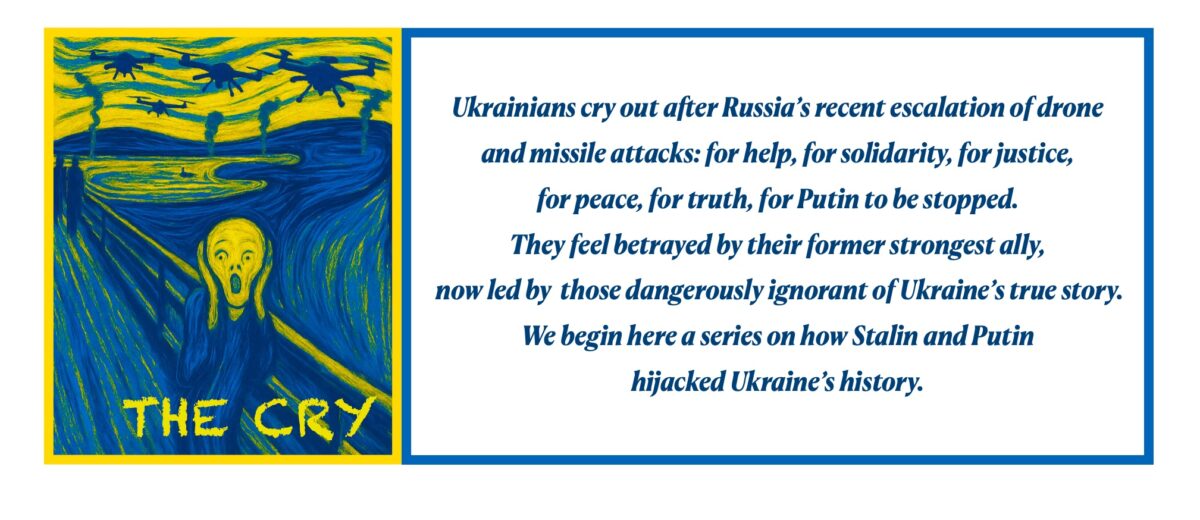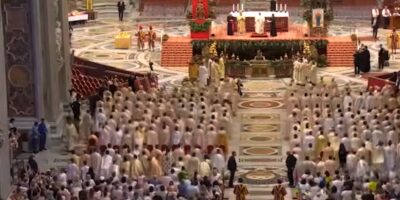In war, the first casualty is truth. Nowhere is this more evident than in the long and brutal campaign waged by Moscow—not only against Ukraine’s sovereignty but against its very identity.
Over the next four Weekly Words, we will examine how Ukraine’s story has been hijacked and manipulated into myths and narratives invented in Moscow. Control over history is control over people. And for centuries, from tsarist emperors to Soviet dictators to the current Kremlin regime, Russia has sought to dominate Ukraine not only with armies, but with a falsified past.
Ukraine is often cast in Russian mythology as “Little Russia”—a junior sibling, not a distinct nation. This narrative traces its roots to imperial times, when tsars fabricated a cultural genealogy tying Moscow to the medieval kingdom of Kyivan Rus’, centered in Kyiv. By doing so, they erased the political and spiritual inheritance of Ukraine, claiming it for Russia. In this version of history, Ukraine is not colonised, it is “gathered” back into a rightful whole.
Stalin took these myths and gave them institutional power. After Ukraine’s short-lived independence between 1917 and 1921, the Red Army forcibly absorbed it into the USSR. Though nominally a Soviet republic, Ukraine had no real autonomy. Stalin’s tactics were not just political; they were cultural, psychological, and historical. The Soviet state rewrote textbooks, criminalised Ukrainian language and literature, purged scholars, and flooded public life with Russian narratives. It wasn’t enough to control Ukraine’s land—Stalin needed to control how Ukrainians remembered their past.
Vilified, dismantled, demolished and murdered
This historical manipulation wasn’t subtle. Ukrainian independence heroes were vilified. The Ukrainian Orthodox Church was dismantled. The “Executed Renaissance” saw hundreds of Ukrainian poets, playwrights, and intellectuals murdered. Meanwhile, monuments were demolished, city names were Russified, and the Ukrainian language was pushed out of public life. What remained was a hollowed-out version of Ukraine—useful to the Soviet narrative, but stripped of its soul.
Why such relentless aggression toward history? Because Stalin understood what authoritarians still understand today: if a people believe they were always meant to be free, they are far harder to dominate. Ukraine’s vibrant cultural life, democratic aspirations, and European orientation were a threat to the Soviet project. Erasing Ukraine’s identity was Stalin’s way of neutralising it.
These tactics didn’t die with Stalin. They are alive and weaponised in today’s Russia. Vladimir Putin’s speeches echo Soviet tropes: Ukrainians and Russians are ‘one people’. Russian state media repeats lies about Crimea ‘always having been Russian’. History books in occupied areas deny the Holodomor—the man-made famine that killed millions in Ukraine—and paint the Red Army as liberators. Just as Stalin needed the past to justify repression, Putin needs the past to justify war.
This is why reclaiming history matters. Since gaining independence in 1991, Ukraine has been involved in a different kind of resistance: restoring the truth. Street names have been changed. Archives have been opened. Soviet monuments have been taken down. Silenced poets are celebrated. Churches have been revived. Ukraine’s act of historical remembrance is not nostalgia—it is nation-building.
Not a borderland
The stakes of this memory war go beyond academia. Historical propaganda is not merely inaccurate—it’s violent. It lays the groundwork for invasion, for genocide, for empire. When Putin denies Ukraine’s existence, he is echoing Stalin, who tried to erase it. And when Ukrainians insist on their history, they are fighting for more than territory. They are fighting for the right to be remembered accurately—as a people who have always been.
We in the West must take this seriously. Too often, we treat history as a settled matter—a subject for museums or dusty textbooks. But in Ukraine, history is alive, contested, and dangerous. It is a front line. That’s why supporting Ukraine also means supporting truth. It means rejecting false equivalencies and calling propaganda what it is: a weapon of war.
Let’s be clear: Ukraine is not a borderland or a breakaway. It is not a mistake. It is not ‘Little Russia’. Ukraine is a nation with deep roots, fierce resilience, and a rightful place in the story of Europe. And telling that story—truthfully, courageously—is an act of resistance we all must share.
Because in the end, those who control the past shape the future. If we allow Stalin’s lies to live on through Putin’s bombs, then we’ve already surrendered to tyranny. But if we help Ukraine reclaim its story, we help it reclaim its future. And that is a cause worth fighting for. (To be continued…)


Till next week,



